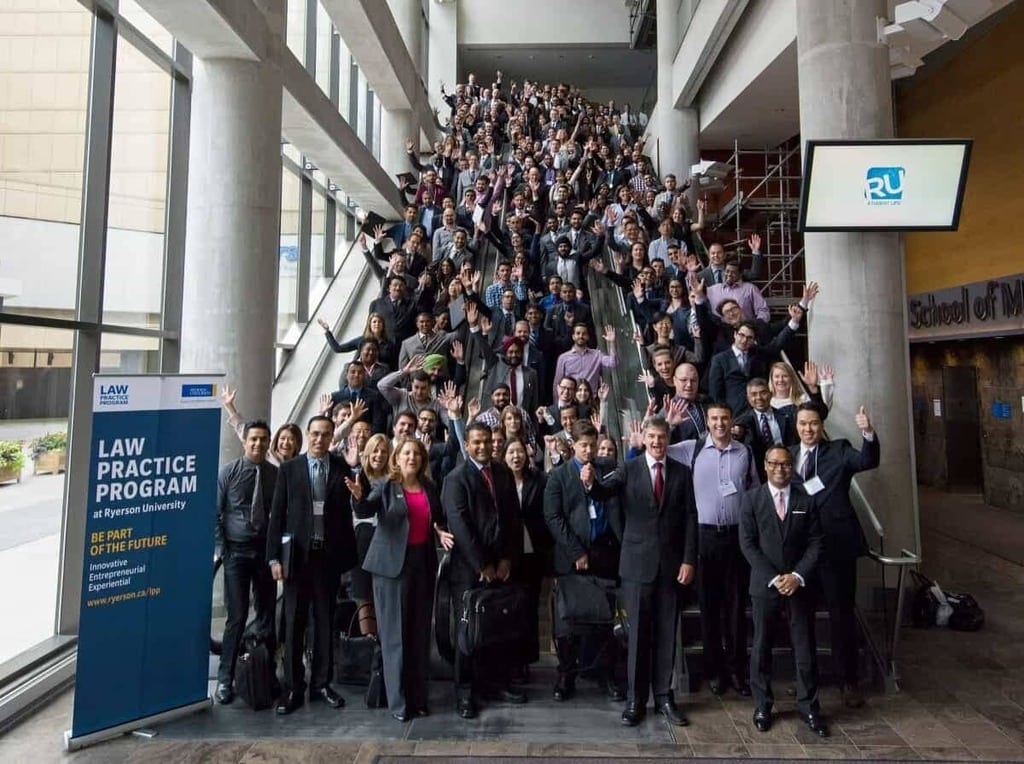Tomorrow (October 19, 2016) is the deadline to the Law Society of Upper Canada for submissions on whether the Ryerson LPP Program.

In a recent update, the Law Society of Upper Canada stated:
As part of the Law Society’s priority to strengthen the licensing process, the Pathways Pilot Project has been evaluated in a report that outlines a number of recommendations.
The Pathways Pilot Project Evaluation and Enhancements to Licensing Report was presented for information at Convocation on September 22, 2016 and the recommendations will be deliberated at Convocation on November 9, 2016.
The Professional Development and Competence Committee welcomes written comments on the report from the professions until October 19, 2016.
Comments* may be submitted by email or regular mail to:
Re: Pathways Pilot Project Evaluation and Enhancements to Licensing report
Policy Secretariat
The Law Society of Upper Canada
Osgoode Hall, 130 Queen Street West
Toronto, ON, M5H 2N6
policy@lsuc.on.ca
The report was generally not favourable. It concluded:
For all the reasons discussed in this Report, the Committee, based on the views of nine of the 14 members, has concluded that the pathway of the pilot known as the Law Practice Program (LPP), despite many positive features, including the excellent program design and delivery by both LPP providers, does not appear to be providing an alternative to articling that has gained acceptance by candidates and the profession and that is sustainable in the long term.
This conclusion of the committee caused not only surprise, but also considerable controversy and frustration with those familiar with the program who have supported it’s initiatives and witnessed its significant benefits over the past several years.
(It even stoked one popular legal publication to describe the lack of support as a “bullshit move.”)
Since my involvement with the program, I too have come to see the benefits that come from the program despite my initial cynicism. I have seen firs hand how it can congeal the significant gaps and shortcomings that the traditional articling system creates.
Here is my response that I submitted to the Law Society today in support of the program:
Dear Madams and Sirs,
I am taking the time to provide my input on the Ryerson LPP program as an effort to persuade the committee and Convocation to retain the program.
My change of view on the LPP program:
When I first came to learn of the LPP program, I was very skeptical and critical of its need and implementation. If you wish, you could even look back to my Twitter commentary where I was one of the harshest critics. In addition, in the course of running for Bencher in the last election, one of the main components to my platform was to actually eliminate the program.
Since then, I have come to learn that my criticism and assumptions were significantly misguided.
I have learned the error of my assumptions as being a Mentor in the program for the first time this year (2016-2017). Since becoming an LPP Mentor, I have seen first had the benefits it offers the students and the profession as a whole. I say this in a context as a lawyer who has practiced for over a decade and has acted as a principles for many students over the years. I also act as a mentor in my capacity as founder to King Law Chambers (home to 50+ lawyers). I mention this context in hopes that it offers credibility to my claim that I have a strong understanding of what proper mentorship means, what it can achieve, and what it requires.
Where articling has failed; what the LPP has done in response:
As I see the issue, and where the notion of articling has gone so astray, is the failure to recognize contemporary needs of the market, proper training of lawyers, and the recognition of a systemic disadvantage that individuals of marginalized groups may face (particularly as it relates to people of colour, aboriginals, and gender-based biases).
In this regard, articling perpetuates an archaic system of training that is grossly inefficient in training individuals in their desired areas of interest with considerable preference placed towards privileged groups of individuals. The LPP on the other hand, takes active measures to ensure inclusion and through the demographics of the program alone, we can easily see the beneficial effects it has through inclusion of members that would otherwise be excluded or marginalized even further in their pursuit of law.
The practice of law in 2017 requires not only a thorough understanding of complex legal issues; but also the equally important understanding of business, marketing, technology, ethics, and client management. The LPP takes active efforts to ensure that these practical skills are well honed before individuals enter the market. Outside of this program, the development of these skills is rare.
With the greatest of respect, a proper reflection of these necessary skills cannot be safely assumed through the successful completion of exams. What aspiring lawyers need, and the LPP offers, is an ongoing mentorship of these advanced and non-legal skills in addition to substantive elements that law school teaches. While it is true that articling can also achieve this, the LPP mandates it as a necessary component of successful completion.
The comprehensive training required in becoming a lawyer is offered by the LPP:
I lament to the days when I was trained as a lawyer where the Law Society offered essentially the same program that the LPP now does. This was through the form of practical training taught by highly qualified practitioners in different areas of laws. When this training was taken out of the licensing of lawyers, I feel it had a profound impact upon the skills that articling provided.
To me it is rather ironic that (like many things in nature) through an organic reaction a system filled the need for this proper training through organic mechanisms – enter the LPP.
I say all this not to be contentious, but to point out that rather than move away from the LPP, we should be making it universal so that it can restore the basic practical training that lawyers once had (as they do in other provinces) that ended around 2007. In an ideal world, I would advocate to have every law student upon graduation take the LPP for basic ethics, business, and general law knowledge before then electing to take specific course in specific practice areas that would permit more specific licensing – something more akin to medicine where one has to do further licensing to be permitted to practice in specialized areas.
Expansion, not destruction of the LPP:
At present, the LPP program is something that I strongly support because I see that it serves as an essential element to the licensing of lawyers in Ontario. If anything, the program should be looked at with the intention of more universal application, rather that elimination.
Unlike the vast majority of articling placements, and most law schools, the LPP actively ensures comprehensive practical training for lawyers entering the market. It does so with the mindset that practicing law in 2016 is far more than just opening a law book and offering advice to a client.
For these and many other reasons I have not stated for the sake of brevity, it is my strong view that the Law Society ought to be looking as to how to enhance, expand, and integrate the LPP into every call rather than dismiss it after it considerable success.
There is no doubt in my mind that it would have a detrimental effect on the profession and cause considerable controversy among the public who looks to the Society to ensure that only properly trained counsel are left to deal with their problems. Improvements in anything form from building upon success, not in razing structures to the ground in hopes of something better being build from the ruins.
Thank you for your consideration,
SR
Please take a moment to offer your own thoughts, especially your support, by emailing
policy@lsuc.on.ca. The input of everyone is considered and matters.







